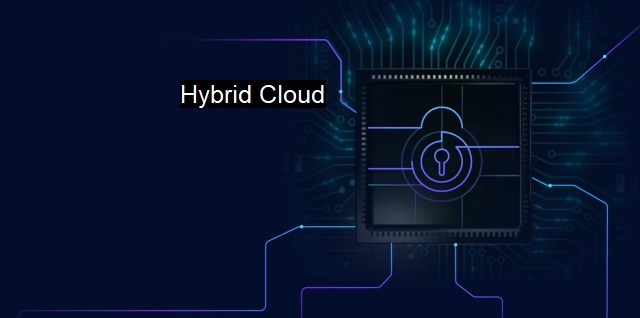What is Hybrid Cloud?
The Power of Hybrid Cloud: Balancing Security and Flexibility in Modern Business Environments
Hybrid cloud is a versatile computing architecture that combines on-site, private cloud and public cloud services, allowing organizations the flexibility to operate and share resources between these diverse platforms. With the ability to maintain control over sensitive data while also enjoying the scalability of the cloud, it provides businesses with a balanced and efficient data management approach.This multifaceted infrastructure's strength lies in its flexibility and customization potential. While businesses can keep sensitive or crucial operations in-house, they can offload broader, less sensitive tasks onto scalable, on-demand, pay-as-you-go public clouds. The manageable flow of data between private and public clouds guarantees user-controlled visibility affordability, scalability, and the flexibility businesses need to respond to changing demands or business environments.
Cybersecurity is crucial when discussing anything cloud-based. In the context of a hybrid cloud, it's amplified due to its unique form. Increased online visibility comes with the potential for increased threat susceptibility, and such potential vulnerabilities need to be managed by strong cybersecurity strategies and resources.
One risk of implementing hybrid cloud computing may lie in having your security compromised from within, especially if you allow third-party public cloud providers access to your private cloud and data. User errors may expose sensitive information and vulnerabilities.
A common security threat in cloud environments is malware, particularly viruses. These malicious bits of code can severely harm computer systems and networks, leading to data theft, corruption, or loss. Antivirus measures are essential safeguards in any cloud environment, aiming to identify, neutralize, or remove these hostile entities.
An ideal approach to handle these threats involves using strong encryption protocols, which make data unreadable if intercepted. Encrypting data in transit and at rest in both the public and private elements of the hybrid cloud moves protection beyond the confines of the physical network. The tiers of security offered by encryption help to build a secure foundation for cloud service technicians to detect abnormalities that signal the presence of malware quickly.
Staff access should be adequately managed through access control methods that grant different levels and scopes of control within the system. This provides a consistent base for monitoring, early threat detection, and maintains a minimum level of user access to sensitive elements of the system.
Monitoring and auditing cloud activities hold significant advantages in supporting cybersecurity operations within the hybrid cloud for detecting and analyzing cyber threats. Robust antivirus systems vigilantly monitor this shared ecosystem to ensure abnormal behavior can be spotted and neutralized quickly before it escalates to a breach.
In the cybersecurity context, also be wary of Advanced Persistent Threats (APTs), which are highly sophisticated, extended attacks on networks that can often bypass network defenses effortlessly. Managed Detection and Response (MDR) tools offer an active response to these threats, continuously surveilling the entire hybrid cloud environment and searching for anomalies with AI.
a hybrid cloud represents an amalgamation of public and private cloud systems that businesses can leverage to get flexible and efficiency-driven operations. its implementation needs to be matched by an equally hybrid set of cybersecurity defenses. These should include firewall protections, meticulous access controls, strong encryption protocols, continuous system monitoring, and robust antivirus measures. Only then can businesses fully immerse themselves in the benefits offered by hybrid cloud computing while managing risk and maintaining secure operations.

Hybrid Cloud FAQs
What is a hybrid cloud?
A hybrid cloud is a computing environment that combines on-premises infrastructure with one or more public cloud providers.What are the benefits of using a hybrid cloud in cybersecurity?
Using hybrid cloud in cybersecurity provides more flexibility and scalability. It can also provide better control over sensitive data and applications.How can antivirus software be used in a hybrid cloud environment?
Antivirus software can be used in a hybrid cloud environment by deploying it on all endpoints, including on-premises and public cloud. Cloud-based antivirus solutions can also be used to protect workloads in public cloud environments.What are the potential security risks of using a hybrid cloud environment?
Potential security risks of using a hybrid cloud environment include data breaches, compliance violations, and unauthorized access. Proper security measures should be implemented to mitigate these risks, including access controls, encryption, and regular security audits.| | A | | | B | | | C | | | D | | | E | | | F | | | G | | | H | | | I | | | J | | | K | | | L | | | M | |
| | N | | | O | | | P | | | Q | | | R | | | S | | | T | | | U | | | V | | | W | | | X | | | Y | | | Z | |
| | 1 | | | 2 | | | 3 | | | 4 | | | 7 | | | 8 | | |||||||